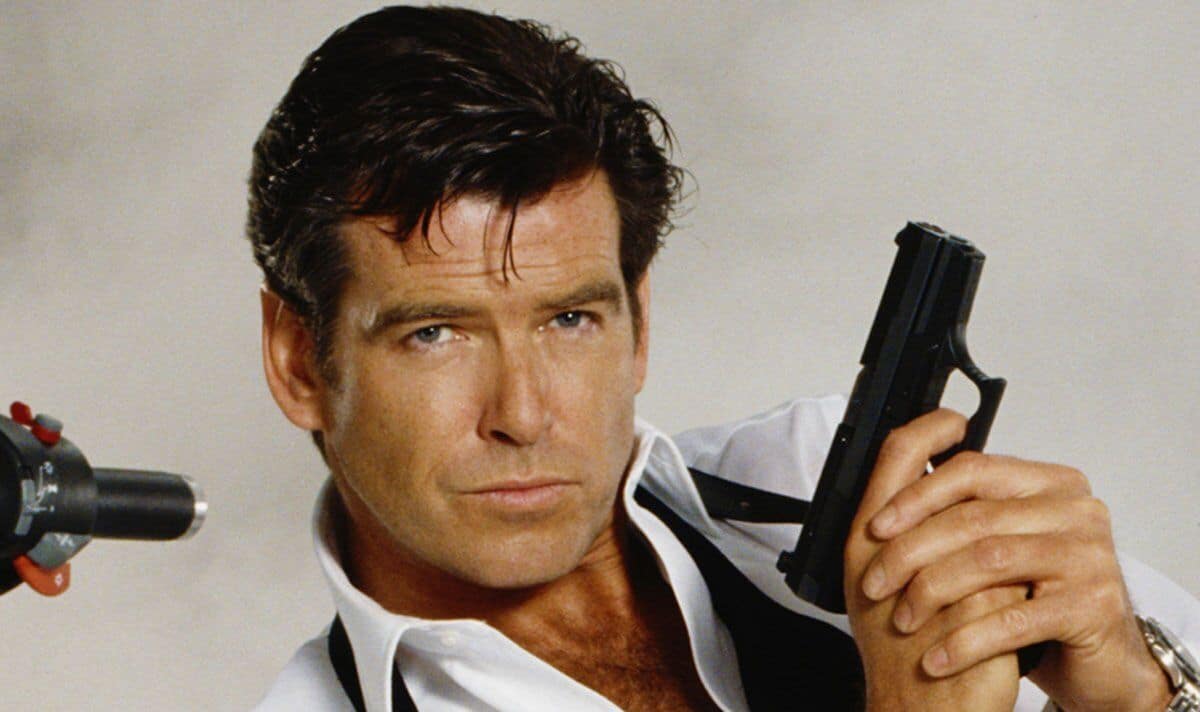For those who grew up in the 1990’s, myself included, your introduction to the James Bond franchise was likely Pierce Brosnan’s first film released in 1995 with GoldenEye. Directed by Martin Campbell, it signaled a return to relevance for a series that had not had a new film in six years and proved that 007 could thrive in a new post-Cold War world. After nearly 30 years following its release, GoldenEye has become a tad dated and while it is not overly reliant on the backdrop of the Cold War to provide its plot, it still dives into that well with unbridled enthusiasm. Brosnan’s next outing as Bond, Tomorrow Never Dies, was seen as a letdown compared to GoldenEye but that film is better than you may remember. In this latest entry in Hindsight, I’ll peel back the layers on Tomorrow Never Dies, Brosnan’s time as the world’s greatest secret agent and why its villain was a precursor to the tech billionaires that have come to rule the world.
Upon its release in 1997, Tomorrow Never Dies managed to outgross its predecessor but it had the distinction of opening the same day as Titanic and it quickly became an afterthought. At the time, critics were divided on the film and in hindsight, was viewed as the beginning of the slow decline that was Pierce Brosnan’s brief time as James Bond but like devilled eggs or skiing trips, Tomorrow Never Dies is not as mediocre as one would believe. As a Bond film itself, it delivers on all of the traits associated with the franchise; the opening scene is exciting, the plot is intriguing, the women are beautiful and tenacious, the gadgets are amusing, the action scenes are top notch and Brosnan is at his peak as 007 with his performance.
What is most likely influencing the perception of Tomorrow Never Dies is the fact that Brosnan’s next two films in the series, The World Is Not Enough and Die Another Day effectively derailed the franchise leading to a reboot in 2006 with Casino Royale starring Daniel Craig as 007. Brosnan’s future films after GoldenEye tried their hardest to outdo it but could not come close but to be fair, it is difficult to top a death-defying bungee jump in the first two minutes or a tank chase through St. Petersburg. So, if Tomorrow Never Dies delivers on all the Bond tropes, why was it viewed as an inferior film?
It was viewed one of the only 007 films to not rely on the Cold War as an intriguing backdrop and introduced a new type of villain; a tech savvy, charismatic, media mogul that seems connected to all levels of power and looks to manipulate world events for profit and influence. The idea seemed farfetched for 1997 but now it is not difficult to imagine Elon Musk building an army of robot girlfriends to validate his sex life or Rupert Murdoch peddling fake news about an election or even Jeff Bezos sending phallic shaped rockets into space except those rockets contain tactical satellites rather than 90-year-old washed up actors who have hilariously bad takes about their former costars. Tomorrow Never Dies’ Elliot Carver was not just a greedy media mogul; he was ahead of his time thanks to his desire to start a world for rating as Bond points out in the film’s climax.
For those unfamiliar with the film, Carver gets up to some truly dastardly deed, he organizes the theft of GPS software from the CIA, he sinks a British warship by setting up the Chinese military as the perpetrators, he has wife murdered after finding out about her previous fling with Bond and is about to start World War 3 just to gain broadcasting rights in China. He is an evil man who is not afraid to derail if it means he gains some small satisfaction from a petty diversion.
While Carver is not physically imposing, he does display an incredible amount of forethought. None of what he does is on a him but has taken years of planning by building up a global communications network and even constructing a boat capable of evading radar detection in order to sneakily attack warships and fighter jets. Carver also is more menacing as he seems like would feel right at home in the 21st Century with the likes of Musk, Murdoch, Bezos or even Trump and would be able to find a justification for any one of his atrocities.
In the new era of misinformation, Elliot Carver could easily plug into this new age and run some type of troll farm or run a social media company designed to sow discontent among the masses. In the late 90’s, it was difficult to imagine how much the Internet would proliferate or even fathom the idea of social media so it was hard to imagine one single, powerful media mogul who would go to extreme lengths to manipulate world events for headlines and newspaper sales.
Now, it is much easier to get news from headlines seen briefly in your feed than it is to pick up a newspaper, read the articles, make informed decisions and to be knowledgeable about the world. Carver is callous and cold particularly when it comes to his wife, Paris. Prior to the film, Bond and Paris enjoyed some type of romantic fling which ended in typical 007 fashion but Paris figured out that he is a secret agent during their tryst.
However, she neglects to tell Elliot about him and the mogul views this as the ultimate betrayal and has her brutally murdered in an attempt to frame Bond for the crime. What’s worse is that after she dies, Carver is next seen in the film crafting headlines and writing an obituary for Bond who he also plans to murder. Carver is cruel, manipulative but also cunning and highly intelligent. His grandiose metaphors and the reveal of his grand plan would normally induce eye rolls but it is terrifying; the British and Chinese fleets are set to kick off World War 3 and Carver intends to launch a missile into Beijing to kill the Chinese High Command, install his puppet as China’s new leader and grant him broadcasting right. Carver ultimately meets his demise by one of the very tools he built to enable these atrocities.
It is a gruesome end but one that is well deserved and we revel in the death of a truly evil villain. In looking back at Pierce Brosnan’s tenure as 007, Elliot Carver stands out in the top half of the villains he went up against because let’s be honest, no one will top Sean Bean’s villainous turn as Alec Trevelyan in GoldenEye but Carver is the villain with the most staying power in to the 21st Century.
So, if we are willing to reevaluate Tomorrow Never Dies, should we reevaluate Brosnan’s entire time as 007? An argument could be made that his time as Her Majesty’s greatest secret agent was victim to poor films and there is some truth to that; The World Is Not Enough showcased a Bond that allowed his guard to come down by a greedy oil heiress and Die Another Day featured a whitewashed North Korean colonel who wants to redo the Korean War by conquering the disputed peninsula.
Die Another Day is probably the worst, if not bottom five, of the entire Bond franchise and derailed Brosan’s tenure so badly that when video game publisher Electronic Arts produced Everything or Nothing, that was viewed as the proper final entry for Brosnan. The game very much copies the style of Die Another Day but delivers on the quintessential 007 moments; car chases, death-defying stunts and world saving heroics all while getting the girl. However, your greatest successes are often overshadowed by your most spectacular failures as Die Another Day’s box office numbers and critical reception signaled to Bond producers Michael G.
Wilson and Barbara Broccoli that a change was necessary so Daniel Craig was cast, the series was rebooted and it led to the most successful period the franchise has ever seen. The case can certainly be made that Brosnan was the right Bond for the wrong time and wrong for the films that were being made during that time. Roger Moore is often derided as being the silliest Bond but was suave, charismatic and knew how to be serious when the situation arose. Brosnan knew how to be like Moore and Sean Connery but was placed in situations that required him to be more like Jason Bourne than 007. The quality of Brosnan’s films after Tomorrow Never Dies cannot be overlooked either. Perhaps if Brosnan was given one final onscreen opportunity, his legacy would be viewed much more favorably.
Featured Image Credit: via Daily Express



